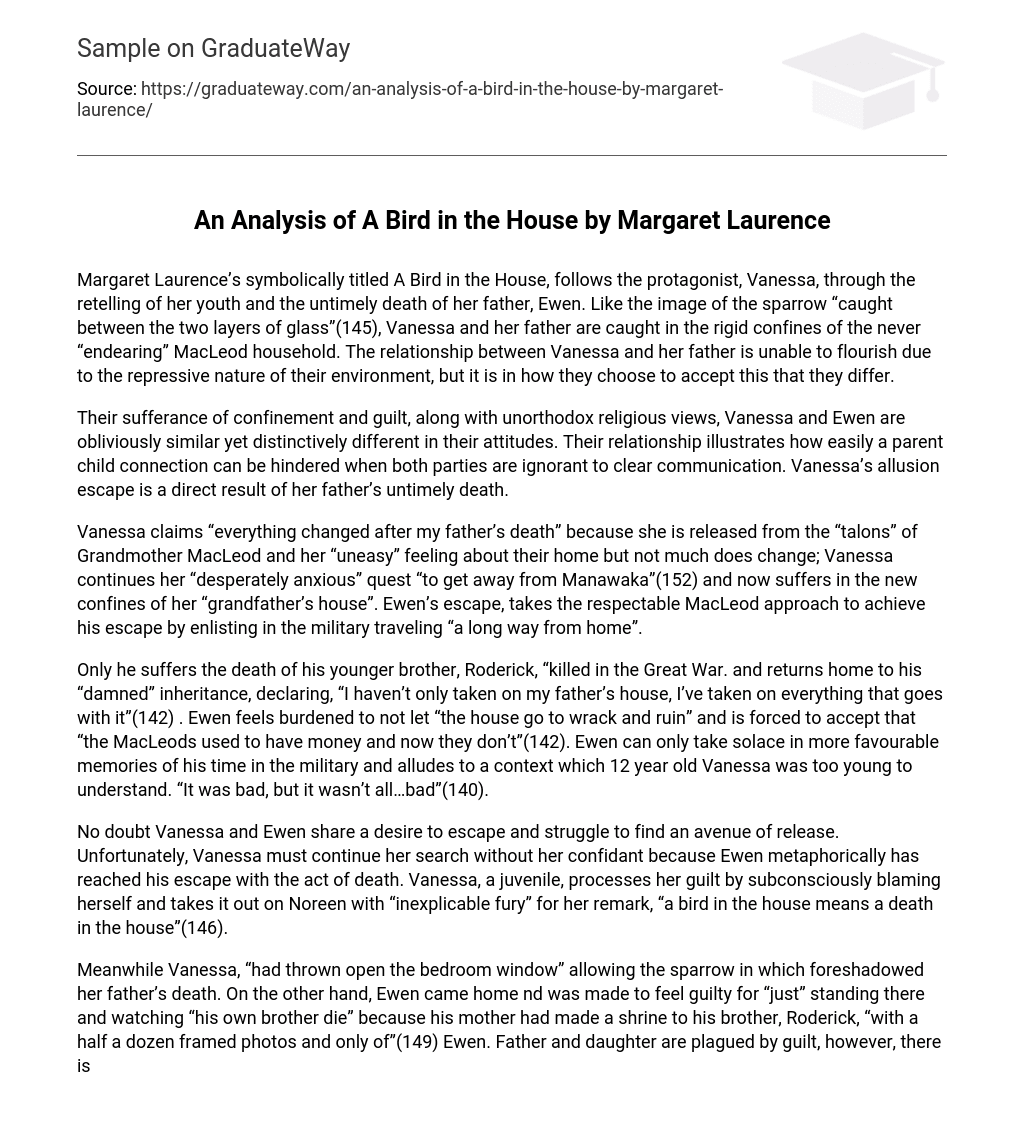Margaret Laurence’s symbolically titled A Bird in the House, follows the protagonist, Vanessa, through the retelling of her youth and the untimely death of her father, Ewen. Like the image of the sparrow “caught between the two layers of glass”(145), Vanessa and her father are caught in the rigid confines of the never “endearing” MacLeod household. The relationship between Vanessa and her father is unable to flourish due to the repressive nature of their environment, but it is in how they choose to accept this that they differ.
Their sufferance of confinement and guilt, along with unorthodox religious views, Vanessa and Ewen are obliviously similar yet distinctively different in their attitudes. Their relationship illustrates how easily a parent child connection can be hindered when both parties are ignorant to clear communication. Vanessa’s allusion escape is a direct result of her father’s untimely death.
Vanessa claims “everything changed after my father’s death” because she is released from the “talons” of Grandmother MacLeod and her “uneasy” feeling about their home but not much does change; Vanessa continues her “desperately anxious” quest “to get away from Manawaka”(152) and now suffers in the new confines of her “grandfather’s house”. Ewen’s escape, takes the respectable MacLeod approach to achieve his escape by enlisting in the military traveling “a long way from home”.
Only he suffers the death of his younger brother, Roderick, “killed in the Great War. and returns home to his “damned” inheritance, declaring, “I haven’t only taken on my father’s house, I’ve taken on everything that goes with it”(142) . Ewen feels burdened to not let “the house go to wrack and ruin” and is forced to accept that “the MacLeods used to have money and now they don’t”(142). Ewen can only take solace in more favourable memories of his time in the military and alludes to a context which 12 year old Vanessa was too young to understand. “It was bad, but it wasn’t all…bad”(140).
No doubt Vanessa and Ewen share a desire to escape and struggle to find an avenue of release. Unfortunately, Vanessa must continue her search without her confidant because Ewen metaphorically has reached his escape with the act of death. Vanessa, a juvenile, processes her guilt by subconsciously blaming herself and takes it out on Noreen with “inexplicable fury” for her remark, “a bird in the house means a death in the house”(146).
Meanwhile Vanessa, “had thrown open the bedroom window” allowing the sparrow in which foreshadowed her father’s death. On the other hand, Ewen came home nd was made to feel guilty for “just” standing there and watching “his own brother die” because his mother had made a shrine to his brother, Roderick, “with a half a dozen framed photos and only of”(149) Ewen. Father and daughter are plagued by guilt, however, there is a distinct difference in how they handle remorse. Vanessa lashes out with “some terrifying need to hurt, burn, destroy”(150). Ewen internalizes his remorse by accepting the familiarity of repression customary to the unemotional MacLeod’s demonstrated by Grandmother MacLeod who “was never seen crying, not even the day of” her son’s funeral.
Vanessa is defiant in her dismissal of Heaven when she “coldly and distinctly” states “there is no Heaven. And it doesn’t matter”(151) when Noreen tries to console her following her father’s death. Ewen’s view on the existence of Heaven and Hell gives inkling to his agnostic leaning: “I don’t think they’re actual places. Maybe they stand for something that happens all the time here, or else doesn’t happen” (148), and contradicts his traditional Calvinist upbringing. Sceptical of his own view, he immediately retracts his statement and says, “it’s kind of hard to explain. I guess I’m not so good at explanations”(148).
Father and daughter, although sharing similar stances on the concept of religion, differ in their admission. Vanessa feels “acceptance” with her agnostic belief that beyond death there is “nothing” and that “it meant only silence, forever”(151). However, Ewen continues obedience and attends evening mass after missing morning mass, even urging Vanessa to join claiming “it wouldn’t hurt. ” Vanessa can only grope at the idea they may have had a communicative relationship but is not certain because “perhaps it would not have been possible anyway”(153) with the obstructions of confinement, guilt and religious conformity they both struggle with.
This is evident when she has her epiphany, discovering the letter & photo address to her father from an “ordinary middle-class” French girl. She realizes then what her father was alluding to about his experience during the war. As result, Vanessa can only hope for her father, “she had meant some momentary and unexpected freedom”(153) as she is ignorant of her father perception. The differences in their struggles are illustrated by the fact that Vanessa continues to push the boundaries of normality in a “small prairie town” but Ewen complacent by years of repression, accepts the limitations of his environment.





